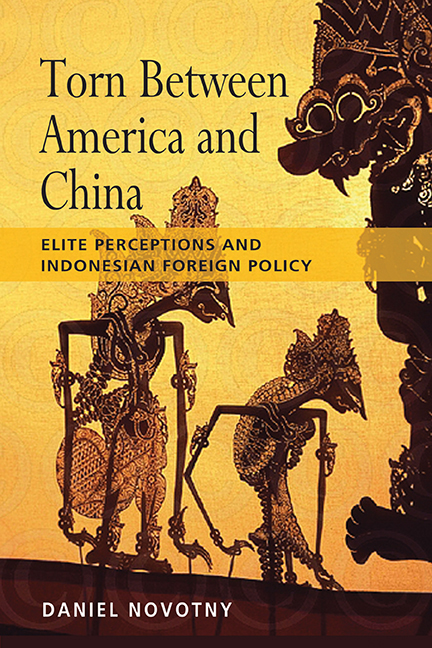Book contents
- Frontmatter
- Dedication
- Contents
- Foreword
- Preface
- List of Figures
- Acknowledgements
- PART I THE CONTEXT
- PART II THE PERCEPTIONS “ANTARA DUA KARANG”
- 4 Elite Perceptions of the United States
- 5 Elite Perceptions of China
- PART III ELITE CONSENSUS AND POLICY OUTCOMES
- Glossary
- Abbreviations
- Bibliography
- Index
- Note on the Author
5 - Elite Perceptions of China
from PART II - THE PERCEPTIONS “ANTARA DUA KARANG”
Published online by Cambridge University Press: 21 October 2015
- Frontmatter
- Dedication
- Contents
- Foreword
- Preface
- List of Figures
- Acknowledgements
- PART I THE CONTEXT
- PART II THE PERCEPTIONS “ANTARA DUA KARANG”
- 4 Elite Perceptions of the United States
- 5 Elite Perceptions of China
- PART III ELITE CONSENSUS AND POLICY OUTCOMES
- Glossary
- Abbreviations
- Bibliography
- Index
- Note on the Author
Summary
INTRODUCTION
In this chapter, we will look closely at the current Indonesian foreign policy elite's perceptions of China. As we have seen in the preceding chapter, the elite have a deeply ambivalent, love-hate attitude towards the United States. In the light of the Indonesian leadership's concern about U.S. predominance and notably the George W. Bush Administration's assertive and unilateralist policies, the following discussion shows that the rise of China is welcomed insofar as it provides Indonesia with a greater space for manoeuvring vis-à-vis the United States and other major powers. Yet, in contrast with the United States that is ultimately viewed as ramah, a friendly power and the main guarantee for peace and stability in the region, this chapter highlights the Indonesian elite's deep-rooted sentiments held towards China, and its perceptions of the former “Middle Kingdom” that have been shaped by the long history of mutual interaction as well as China's geographic proximity.
The increasingly close economic, political and cultural ties between Indonesia and China stand in contrast to Jakarta's rather problematic and volatile relationship with Washington after 2002. We can question here whether the marked upswing in the Indonesia-China bilateral relations can be interpreted as a departure from the New Order's cautious approach to the long-standing “China threat” phenomenon. While pointing to some positive effects of China's rise for Indonesia, the leaders are simultaneously very much concerned about the prospect of facing a giant with hegemonic intentions at Indonesia's doorstep. Here, this chapter draws on the preceding one, and within the framework of balance-of-threat theory, it provides a comparative account of the elite perceptions of China and the United States in the context of the “mendayung antara dua karang” thesis.
POST-SUHARTO PERIOD: CHANGE AND CONTINUITY OF THE “CHINA THREAT” PERCEPTION
The preceding chapter drew attention to the recent rise of anti-American sentiments among Indonesia's population and growing suspicion about Washington's global actions among the country's elite. In contrast to Jakarta's rather volatile and problematic relationship with Washington, especially from 2002 onwards, Indonesia's relations with China have displayed an overall upward tendency.
- Type
- Chapter
- Information
- Torn between America and ChinaElite Perceptions and Indonesian Foreign Policy, pp. 174 - 244Publisher: ISEAS–Yusof Ishak InstitutePrint publication year: 2010

